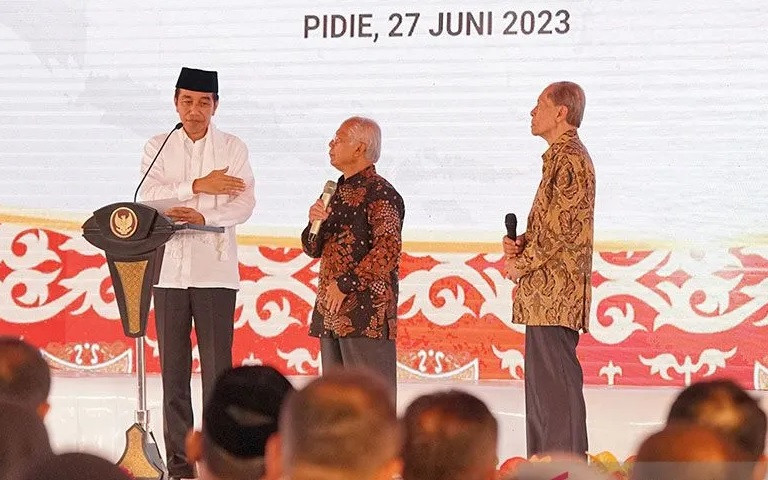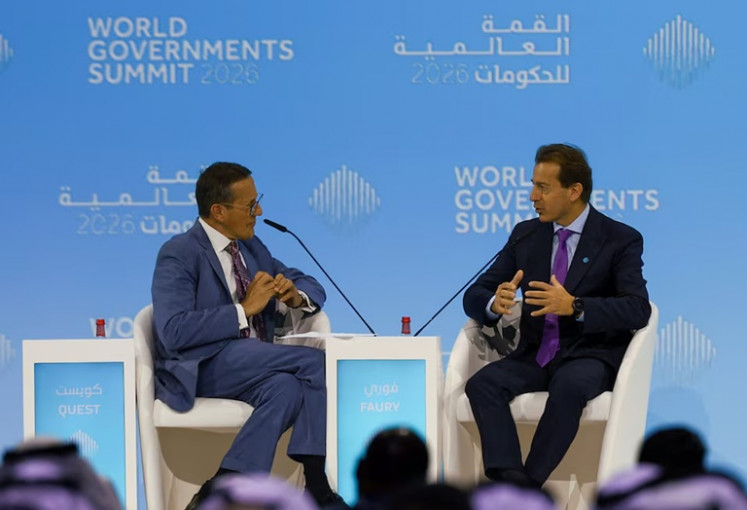Popular Reads
Top Results
Can't find what you're looking for?
View all search resultsPopular Reads
Top Results
Can't find what you're looking for?
View all search resultsHuman rights reparations
The government’s move to seek an out-of-court settlement of the rights abuses is surely too little, too late. But it is still much better than nothing.
Change text size
Gift Premium Articles
to Anyone
 President Joko “Jokowi”Widodo (left) speaks with victims of the 1965 atrocities Jaroni Surjomartono (center) and Sudaryanto Priyono during the launch of government’s non-judicial settlement of 12 past human rights violations at Geudong Hosue in Pidie regency, Aceh on June 27, 2023. (Antara/Khalis Surry)
President Joko “Jokowi”Widodo (left) speaks with victims of the 1965 atrocities Jaroni Surjomartono (center) and Sudaryanto Priyono during the launch of government’s non-judicial settlement of 12 past human rights violations at Geudong Hosue in Pidie regency, Aceh on June 27, 2023. (Antara/Khalis Surry)
P
resident Joko “Jokowi’ Widodo on Tuesday launched a nationwide non-judicial settlement of 12 gross human rights violations in Rumoh Geudong in Pidie, Aceh, where over 100 people were allegedly tortured and killed by security forces more than two decades ago during operations to quell a rebellion in the province.
While the brutality in Rumoh Geudong was the last on the government’s list of crimes against humanity that dated back to the aftermath of the 1965 coup attempt blamed on communists, the event on Tuesday is expected to lead the nation to the much-awaited process of healing old wounds, starting with the state’s confession of guilt and apology for the dark past, Jokowi told victims of the human rights violations
“Thank God, we can start the recovery of the rights of victims of the 12 gross human rights violations,” the President said in front of victims, and families of victims, of the past atrocities, including two former Indonesian nationals who were rendered stateless after the 1965 tragedy. Jokowi said the government was committed to preventing such atrocities recurring in the future.
The crimes took place over a span of 33 years from 1965 to 1998, with nobody held accountable, although it was obvious they implicated the state’s security apparatus. Over decades they became mere numbers, although it was believed the government could have uncovered the truth if it had sufficient political will. It is also believed that many suspected perpetrators of the crimes are still alive, and enjoy impunity, perhaps because of their connections to the powers that be.
Regime changes made no difference when it came to settlement of past atrocities until President Jokowi formed the Team for Non-Judicial Solution on Gross Human Rights Violations last year, apparently to fulfill his campaign promise in 2014. The team recommended 12 cases to Jokowi in January of this year.
They include the communist purge of 1965-1966, which targeted alleged members and sympathizers of the now defunct Indonesian Communist Party (PKI) and left thousands of Indonesians stranded abroad, mostly in socialist countries such as the former Soviet Union, China and eastern Europe; the Talangsari massacre in Lampung in 1989, which has been linked to Gen. (ret) Hendropriyono, a Jokowi ally; the 1997-1998 forced disappearance of pro-democracy activists; the May 1998 shooting of Trisakti University students; the Semanggi I and II shootings of students; the Banyuwangi mass killings; the 1993 Simpang Kertas Kraft Aceh (KKA) incident and the 1998 Rumoh Geudong killings in Aceh. Interestingly, presumptive presidential candidate Defense Minister Prabowo Subianto was discharged from the military in 1998 due in part to his role in the abduction of pro-democracy activists.
Coordinating Political, Legal and Security Affairs Minister Mahfud MD said the government chose Aceh as the venue for Tuesday’s landmark event in a show of respect toward the Aceh people for their support for peace and for those who perished in the 2004 tsunami.
The government’s move to seek an out-of-court settlement of the rights abuses is too little, too late. The initiative is half-hearted, but it is still much better than nothing, especially after the government’s long-standing denials.
The ceremony in Pidie on Tuesday was just the beginning of herculean efforts to restore the rights of the victims, the numbers of which far exceed the data collected by government agencies, including the Attorney General’s Office.
The government has promised reparation will reach all the victims of the human rights crimes or their families before Jokowi ends his second term in October next year. As Jokowi will be unlikely to be able to offer a comprehensive solution, it will be a challenge for his successor to finish the job.
The most difficult test facing Indonesian leaders, which Jokowi has failed to pass, is to bring perpetrators of the gross crimes to justice, or, as South Africa and Timor-Leste have achieved, make them admit their wrongdoings and offer them amnesty under a truth and reconciliation mechanism.










